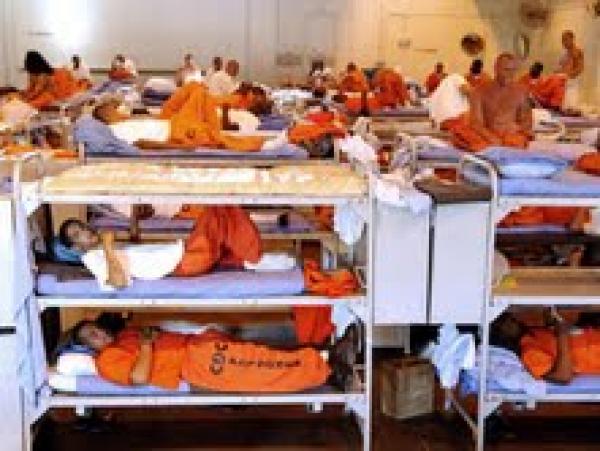

A prison cell. Photo from Robin Wood’s presentation at the SA TB Conference.
27 November 2014
Lack of mattresses, a leaking roof, lack of hot water and insufficient access to medical treatment: Pollsmoor’s facility for awaiting trial prisoners has been slammed by civil society organisations for what they call “several concerns regarding conditions of detention at the facility.”
The Visitors Committee for Pollsmoor, the Treatment Action Campaign, Sonke Gender Justice, Lawyers for Human Rights and the Bonteheuwel Support Group for ex-offenders, have written to the Department of Correctional Services, raising their concerns about 200 detainees in units E2 and B3 in the awaiting trial section of the prison.
According to the letter, dated 6 November 2014, “since June 2014 the Independent Correctional Centre Visitors for Pollsmoor [awaiting trial section] have been raising persistently the concern that 200 detainees in units E2 and B3 are compelled to sleep on the floor, due to the insufficient supply of mattresses. Unit B3 reportedly has a leaking roof, which means that detainees there are required to sleep on a wet floor. In addition, the detainees at Pollsmoor [awaiting trial section] have been without hot water since April 2014.”
The letter, which asked for a response within two weeks, was sent to several people in the department including regional commissioner, Delekile Klaas who confirmed that the letter had been received. But he denied the allegations. “We don’t know where these allegations are coming from because Sonke ad TAC do not have access to our centres. Detainees have beds and the ones that don’t are given mattresses. After receiving the letter I went to the facility personally to double check this. The geysers at the centre work like any other normal geyser. If you wake up early, you get hot water. If you wake late or like other detainees, decide to only wash later, you get cold water. We do not monitor how much water is being used by each prisoner. As for medical treatment, especially for TB, all detainees, especially new ones are screened for TB using the Gene Xpert [a relatively new device that detects TB with reasonable accuracy in a couple of hours - Editor]. If they are found to have TB, they are put on treatment immediately.”
He continued, “The person who wrote that report, wrote it with bad intention. It is a malicious campaign by Sonke, a publicity stunt. There will be no response because they did not even communicate with me about this and they did not use the correct channels. They just sent this letter,” said Klaas.
An official of the Judicial Inspectorate, which monitors treatment of inmates and conditions in correctional centres, said they were aware of the lack of mattresses and lack of hot water at the Pollsmoor Remand Centre through a mini inspection report submitted by an Independent Correctional Centre Visitor (ICCV) from the Centre. No individual complaints from inmates were received regarding these issues.
“We conducted an inspection at the centre earlier this year. We found that the lack of mattresses appear to be a national problem within the department (interim measures were taken by the centre to lessen the problem; more blankets were given to inmates who did not have a mattress). Further, the head of the centre subsequently indicated that the department of public works has sorted [out] the warm water issue,” said the official.
Sonke Gender Justice’s policy and advocacy advisor Emily Keehn, said they first learnt about the situation from a visitors committee meeting, where the issue was tabled.
“We found out this information through legal means and we decided to advocate and help after we learnt that even though there have been numerous complaints to the department about the detention facility conditions, nothing has been done about it. As we know there are many problems in prisons, one being health. We don’t even know whether any of the detainees are HIV-positive or if they need medical assistance. It is very disheartening that there hasn’t been a response to our letter yet, but we will not give up. We just want the department to sit down and talk to us about this situation,” said Keehn.
In response to Delekile Klaas’ answer to the allegations, Keehn told GroundUp, “Sonke Gender Justice and TAC have a legitimate interest in this matter. We count current and former inmates and remand detainees amongst the stakeholders we serve and whose human rights we seek to advance. We learned of the 200 remand detainees sleeping on the floor in Pollsmoor Remand Detention Facility through the Judicial Inspectorate for Correctional Services, which has the statutory mandate to inspect prison conditions and deal with complaints from inmates. Their independent correctional centre visitors have visited these 200 remand detainees themselves and sought to resolve the complaints through internal mechanisms to no avail.
“Sonke and TAC learned of these conditions through our regular participation in the Pollsmoor Visitors Committee meetings, where it was tabled. Our presence was in line with section 94(3)(d) of the Correctional Services Act of 1998 which states these committees are empowered to “extend and promote the community’s interest and involvement in correctional matters”. No confidential information was shared with us; only the fact that these conditions were ongoing and that they had no success in resolving the matter with the Department of Correctional Services following internal procedures. In the October Visitors Committee meeting, all the participants agreed to send this letter to Regional Commissioner Klaas, as was proper.
“Regional Commissioner Klaas has effectively claimed that the ICCVs and detainees have fabricated these complaints. We assert that the onus is on the Department of Correctional Service to allow independent verification of these conditions through direct engagement with the remand detainees. We stand behind the ICCVs who have personally interacted with the 200 detainees. The Department should transparently and fully cooperate with the ICCVs instead of denying, closing ranks, and shifting the blame.”